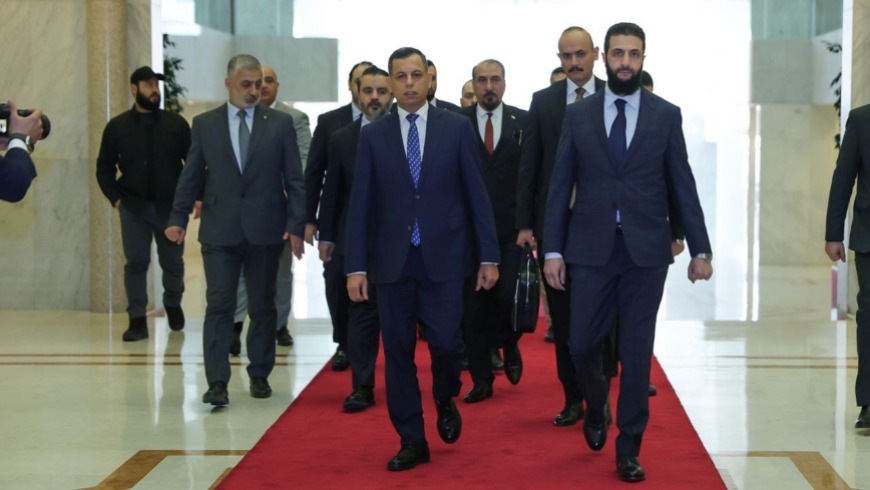Syrian diplomatic sources have denied reports from Iraqi media outlets claiming that the new Syrian administration has extended invitations to Iran to resume diplomatic relations.
Speaking to Syria TV, the sources confirmed that no direct communication has taken place between Damascus and Tehran. Instead, Damascus has urged Russian officials to pressure Iran into halting its destabilizing activities in Syria. According to the sources, this request was incorporated into ongoing discussions between Damascus and Moscow regarding the future of their bilateral relations.
Iraqi Forces Seek to Justify Their Rapprochement with Syria
Syria TV has learned from Iraqi political sources that Baghdad is preparing to receive Syrian Foreign Minister Asaad al-Shaibani in the coming period, signaling a shift in relations from intelligence-level coordination to full political engagement.
In this context, Iraq’s ruling factions are attempting to justify their renewed openness to Syria to their domestic base. Media leaks from outlets affiliated with Popular Mobilization Forces (PMF) factions have been promoting the narrative that Damascus is actively seeking to mend ties with Tehran.
These leaks were preceded by surprising remarks from Qais al-Khazali, leader of Asa’ib Ahl al-Haq, who stated that the recent developments in Syria were not a “terrorist project” but rather a military-driven political shift to seize power. He further claimed that holy sites were not targeted, contrasting the situation with events in 2013.
Khazali also revealed that on the first day of the latest confrontation with the Assad regime, the Syrian military leadership had sent messages to Iraq assuring that shrines and religious sanctuaries would remain unharmed.
Meanwhile, the Iraqi government is expected to invite Syrian President Ahmad al-Sharaa to attend the Arab Summit scheduled to take place in Baghdad in May.
Iran’s Ambition to Reassert Influence in Syria
According to well-informed diplomatic sources, Iran is seeking to reestablish its influence in Syria for multiple reasons. Chief among them is demonstrating its resilience and refusing to acknowledge defeat, in order to maintain credibility among its regional allies. Additionally, Tehran aspires to regain access to Syria’s Mediterranean ports, leveraging them for economic and strategic purposes.
A faction within Iran’s leadership believes that Syria may, over time, consider gradually restoring ties with Tehran, particularly given the persistence of Western sanctions and the lack of Arab or Turkish initiatives to break these sanctions or provide economic support to Damascus.
In pursuit of this goal, Iran has already reached out to two regional states, seeking their mediation to reopen channels with Damascus and break the diplomatic stalemate. However, these efforts have so far yielded no concrete results.
Despite this, Iran continues to hold leverage over the Syrian administration. Among its tools of influence is its containment of dozens of former Syrian military intelligence and 4th Division officers, who have been relocated to Revolutionary Guard camps along the Iran-Iraq border.
Damascus views these officers as a potential threat, believing they retain the capacity to mobilize remnants of the former regime’s networks, potentially orchestrating operations that could undermine security and stability in Syria.
Caution, Not Reconciliation
Given these factors, the Syrian administration sees value in de-escalating tensions with Tehran, avoiding actions that could provoke Iran into destabilizing the transitional phase. However, despite this strategic caution, it remains unlikely that Syria will fully restore diplomatic relations with Iran in the near future.
At the very least, Damascus is expected to delay any major moves until U.S. foreign policy under the Trump administration becomes clearer—particularly regarding Iran.
From Damascus’ perspective, any overtures toward Tehran could jeopardize its efforts to secure the lifting of U.S. and Western sanctions. Additionally, Syria’s new regional positioning—post-Assad—along with evolving geopolitical balances, necessitates a more measured approach toward any Iranian attempts to reestablish ties.
This article was translated and edited by The Syrian Observer. The Syrian Observer has not verified the content of this story. Responsibility for the information and views set out in this article lies entirely with the author.


